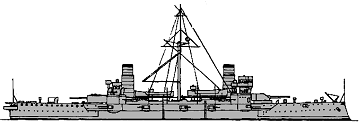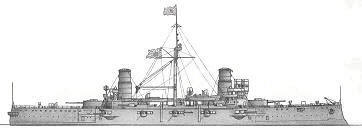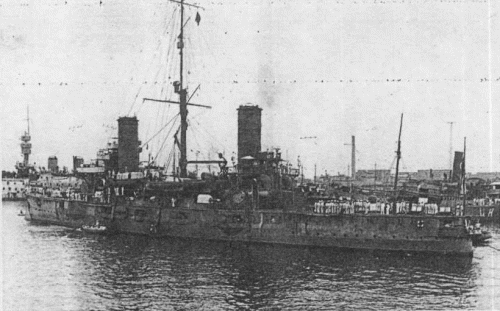

Kasuga 1904

Nisshin 1904
| Name | No | Yard No | Builder | Laid down | Launched | Comp | Fate |
| 春日 [Kasuga] (ex-Rivadavia, ex-Mitra) | 129 | Ansaldo, Genoa, Italy | 10.3.1902 | 22.10.1902 | 7.1.1904 | hulk 1942 | |
| 日進 [Nisshin] (ex-Mariano Moreno, ex-Roca) | 130 | Ansaldo, Genoa, Italy | 5/1902 | 9.2.1903 | 7.1.1904 | stricken 1935 |
|
Displacement normal, t |
Kasuga: 7628 Nisshin: 7698 |
|
Displacement full, t |
8500 |
|
Length, m |
104.9 pp 108.8 wl 111.7 oa |
|
Breadth, m |
18.9 |
|
Draught, m |
7.32 |
|
No of shafts |
2 |
|
Machinery |
2 VTE, 12 cylindrical boilers |
|
Power, h. p. |
13500 |
|
Max speed, kts |
20 |
|
Fuel, t |
Kasuga: coal 1565 Nisshin: coal 1316 |
| Endurance, nm(kts) | 5500(10) |
|
Armour, mm |
belt: 150 - 70, upper belt: 150, barbettes: 150 - 100, turrets: 150, casemates: 150, deck: 38 - 25, CT: 150 |
|
Armament |
Kasuga: 1 x 1 - 254/40 Armstrong R, 1 x 2 - 203/45 Armstrong W, 14 x 1 - 152/40 Armstrong Z, 10 x 1 - 76/40 Armstrong N, 6 x 1 - 47/40 3pdr Hotchkiss Mk I, 2 x 1 - 7.7/87, 4 - 450 TT (beam) Nisshin: 2 x 2 - 203/45 Armstrong W, 14 x 1 - 152/40 Armstrong Z, 10 x 1 - 76/40 Armstrong N, 4 x 1 - 47/40 3pdr Hotchkiss Mk I, 2 x 1 - 7.7/87, 4 - 450 TT (beam) |
|
Complement |
600 |
Project history: Originally laid down for the Italian Navy, but bought by Argentina for the war against Chile after they were launched. The war had ended by the time they were completed and Argentina, having no further use for such large ships, sold them to Japan who wished to match the Russian Far East Fleer. The Kasuga, laid down as the Mitra, was renamed Rivadavia by Argentina, and the Nisshin, laid down as the Roca, was renamed Mariano Moreno by Argentina.
They were the final development of the Italian Giuseppe Garibaldi and were exceedingly powerful ships. Although the main bell was only 150mm thick compared to the 178mm belt on Japan's other armoured cruisers, it extended aver a greater proportion of the hull. The belt also extended for a greater depth at its maximum thickness, there being no upper belt of thinner armour. This single armour belt extended from the waterline to the upper deck, encasing ten of the 152mm guns in the midships battery.
Ship protection: Main 150mm belt (full ship length, 2.8m high) and upper belt (52x2.0m) expanded to upper deck connecting with 150mm casemate protection, main and upper belts were closed by 150mm bulkheads abreast barbettes. Main belt thickness was 75mm on short parts at ship ends. 25mm deck was connected with lower edge of main belt by 38mm slopes. It has turtleback form and 38-25mm thickness outside barbettes. CT had 150mm sides. All 10``, 8`` and 6`` guns had 150mm protection.
Modernizations: circa 1922, both: - 10 x 1 - 152/40, 6 x 1 - 76/40
1924, Kasuga: - 6 x 1 - 47/40; + 1 x 1 - 76/40 3-shiki
1924, Nisshin: - 4 x 1 - 47/40; + 1 x 1 - 76/40 3-shiki
Naval service: Both actively participated in the Russian-Japanese war, and acted mainly in one line with Togo battleships as their actual speed did not exceed 18kts.
In 1917-1918 Nisshin served on Mediterranean. In 1927 she was reclassified as TS, in 1935 she became floating target and next year has been sunk. Kasuga 13.1.1918 ran aground in Banka Straits (Indonesia) and salvaged only in June. Since 1925 she served as TS, and in July, 1942 she was disarmed and converted to a hulk. She was sunk by American aircraft, salvaged in 1948 and scrapped.

Nisshin 1917
Many thanks to Wolfgang Stöhr for additional information on this page.
© Ivan Gogin, 2008-14